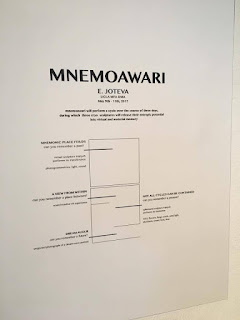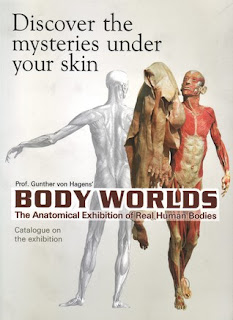Event 2: Mnemoawari – by Elí Joteva
This past Tuesday, on May 9th,
I attended Elí
Joteva’s solo exhibition, titled “Mnemoawari”, at the Broad Arts Center in
UCLA. Currently a graduate student in UCLA’s Design | Media Arts department, Joteva
is also an inter-media artist and researcher who combines neurophysics and art
through the use of imaging tools and biofeedback technologies. In other words,
she is interested in phenomena related to brain function and presents art
pieces that incorporate bioimaging techniques. The first thing that intrigued
me about this solo show was the title: mnemo-,
meaning memory in Greek, and -awari, which translates to wanderer in Hindi. Walking into the
gallery, I immediately saw a sign that described the purpose of her exhibition.
It was a pleasure meeting Joteva at the exhibition, and I enjoyed experiencing
the artist’s expression of memory and time!
(Exhibition sign (left picture), and a hanging cryogenic sculpture and VR headset in the background. There were a lot of people at this exhibition!)
Over the course of three days,
cryogenic sculptures would slowly melt and reveal their true appearance. Meanwhile,
an interactive virtual reality headset and projected 3-D images showed what the
final sculptures would look like. To be honest, the multimedia installation was
a little challenging to interpret. As I entered the “mnemonic place fields” on
the lower floor, I heard a loud and repetitive ticking sound. As the images revolved on the
large screens, the sculptures seemed to be made of various materials such as sand,
flowers, seeds, and metal. Returning to the main floor, I saw the cryo
scultpures hanging from ropes and bowls underneath to catch the dripping water
droplets. Thankfully, Elí
Joteva was present to explain details of her exhibition.
(On the lower floor, an open space allowed attendees to gaze at the spinning 3-D images of the sculptures).
By using these imaging techniques, Joteva
was commenting on how virtual and material memory seem to affect our impression
of time. In addition to the cryo sculptures and their final forms, a projected
photograph of dream waves provided insight on how humans sometime have déjà vu
and remember a future event. Awareness of any memories allows the formation of
objects that may not even exist yet. Joteva believes that tapping into the power
of memory can help people visualize the world in a new way. This solo
exhibition definitely left me thinking about déjà vu, when I feel like I’ve
already dreamed about a present situation. Sadly, this gallery also made me
remember that I have poor memory overall…
(Group picture!)






Comments
Post a Comment